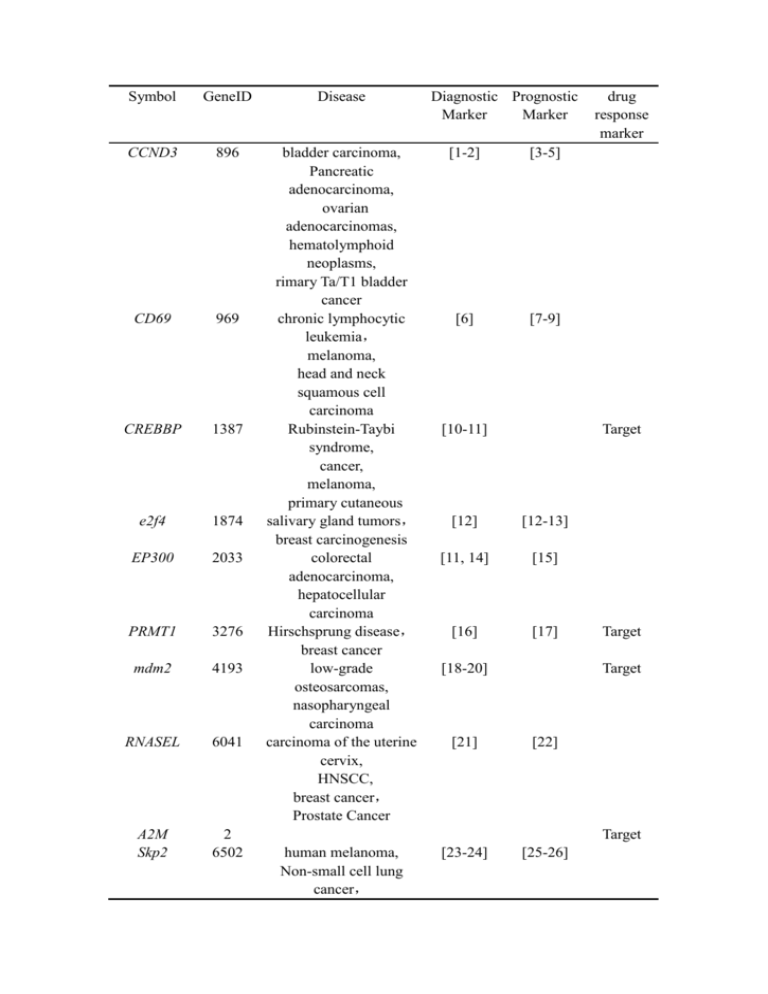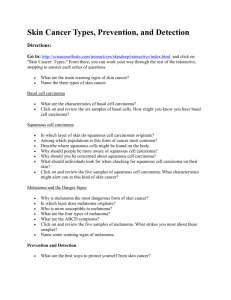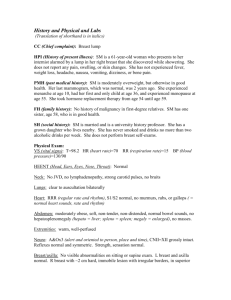file - BioMed Central
advertisement

Symbol GeneID Disease CCND3 896 CD69 969 CREBBP 1387 e2f4 1874 EP300 2033 PRMT1 3276 mdm2 4193 RNASEL 6041 bladder carcinoma, Pancreatic adenocarcinoma, ovarian adenocarcinomas, hematolymphoid neoplasms, rimary Ta/T1 bladder cancer chronic lymphocytic leukemia, melanoma, head and neck squamous cell carcinoma Rubinstein-Taybi syndrome, cancer, melanoma, primary cutaneous salivary gland tumors, breast carcinogenesis colorectal adenocarcinoma, hepatocellular carcinoma Hirschsprung disease, breast cancer low-grade osteosarcomas, nasopharyngeal carcinoma carcinoma of the uterine cervix, HNSCC, breast cancer, Prostate Cancer A2M Skp2 2 6502 Diagnostic Prognostic Marker Marker [1-2] [3-5] [6] [7-9] [10-11] Target [12] [12-13] [11, 14] [15] [16] [17] [18-20] [21] drug response marker Target Target [22] Target human melanoma, Non-small cell lung cancer, [23-24] [25-26] Tsg101 IKBKAP 7251 8518 tp63 8626 PRKCDBP Rassf3 Apex1 112464 283349 328 DDX5 1655 Hnf4a 3172 PDE4D Rnf4 ROS1 TRIM24 Sirpa MIR17HG 5144 6047 6098 8805 140885 407975 csf1r 1436 Hdac1 sp1 tubB 3065 6667 203068 ST5 6764 TP53RK NCOA7 TMPRSS6 112858 135112 164656 Fam129c STRA13 SMARCA4 199786 201254 6597 PML 5371 nasopharyngeal carcinoma, diffuse large B-cell lymphoma breast cancer familial dysautonomia. Prostate cancer, node negative breast cancer neuroblastoma. cancer prostate cancer, osteosarcoma multiple myeloma tumorigenesis type 2 diabetes, colorectal carcinoma prostate cancer colorectal cancers cholangiocarcinoma breast cancer breast cancer alveolar rhabdomyosarcoma hepatocellular carcinoma AML glioma head and neck squamous cell carcinoma diffuse large B-cell lymphoma MCF7 cancer cell line breast cancer breast cancer, iron-refractory iron deficiency anemia colorectal cancer renal carcinomas atypical teratoid/rhabdoid tumor esophageal squamous [27] [28-29] [30] [31] [32] [33] [34] [35] Target [38] Target [36] [37] [39] [40] [41] [42] Target [43] [44] [45] [46] Target [47] [48] [49] Target [50] [51] [52] [53-54] [55] [56] [57] [58-60] Target cell carcinomas, ampullary cancer, gallbladder carcinomas anxa3 HIF1A 306 3091 cast 831 CSNK2A1P 1457 HSP90AA2 3320 Mttp 259 PLD1 5337 plg 5340 RXRA 6256 Rxrb 6257 TUBA4A 7277 Grin3a 116443 SLC44A3 126969 KAT2B 8850 Syt2 127833 SLC36A1 206358 med1 5469 Mapk8 5599 NCOA1 8648 DCN 1634 Mapk9 6274 esophageal squamous cell carcinoma. [61] Target Target Target Target Target Target Target Target Target Target Target Target Target Target Target Target Target Target Target Target Target References 1. Lopez-Beltran A, Ordonez JL, Otero AP, Blanca A, Sevillano V, Sanchez-Carbayo M, Munoz E, Cheng L, Montironi R, de Alava E: Cyclin D3 gene amplification in bladder carcinoma in situ. Virchows Arch 2010, 457:555-561. 2. Birnbaum DJ, Adelaide J, Mamessier E, Finetti P, Lagarde A, Monges G, Viret F, Goncalves A, Turrini O, Delpero JR, et al: Genome profiling of pancreatic adenocarcinoma. Genes Chromosomes Cancer 2011, 50:456-465. 3. Metcalf RA, Zhao S, Anderson MW, Lu ZS, Galperin I, Marinelli RJ, Cherry AM, Lossos IS, Natkunam Y: Characterization of D-cyclin proteins in hematolymphoid neoplasms: lack of specificity of cyclin-D2 and D3 expression in lymphoma subtypes. Mod Pathol 2010, 23:420-433. 4. Levidou G, Korkolopoulou P, Thymara I, Vassilopoulos I, Saetta AA, Gakiopoulou H, Konstantinidou A, Kairi-Vassilatou E, Pavlakis K, Patsouris E: Expression and prognostic significance of cyclin D3 in ovarian adenocarcinomas. Int J Gynecol Pathol 2007, 26:410-417. 5. Lopez-Beltran A, Requena MJ, Luque RJ, Alvarez-Kindelan J, Quintero A, Blanca AM, Rodriguez ME, Siendones E, Montironi R: Cyclin D3 expression 6. 7. 8. 9. 10. 11. 12. 13. 14. 15. 16. 17. in primary Ta/T1 bladder cancer. J Pathol 2006, 209:106-113. Petersen CC, Nederby L, Roug AS, Skovbo A, Peterslund NA, Hokland P, Nielsen B, Hokland M: Increased expression of CD69 on T cells as an early immune marker for human cytomegalovirus reactivation in chronic lymphocytic leukemia patients. Viral Immunol 2011, 24:165-169. Hernberg M, Mattila PS, Rissanen M, Hansson J, Aamdal S, Bastholt L, von der Maase H, Schmidt H, Stierner U, Tarkkanen J: The prognostic role of blood lymphocyte subset distribution in patients with resected high-risk primary or regionally metastatic melanoma. J Immunother 2007, 30:773-779. Hillen F, Baeten CI, van de Winkel A, Creytens D, van der Schaft DW, Winnepenninckx V, Griffioen AW: Leukocyte infiltration and tumor cell plasticity are parameters of aggressiveness in primary cutaneous melanoma. Cancer Immunol Immunother 2008, 57:97-106. Badoual C, Hans S, Rodriguez J, Peyrard S, Klein C, Agueznay Nel H, Mosseri V, Laccourreye O, Bruneval P, Fridman WH, et al: Prognostic value of tumor-infiltrating CD4+ T-cell subpopulations in head and neck cancers. Clin Cancer Res 2006, 12:465-472. Sharma N, Mali AM, Bapat SA: Spectrum of CREBBP mutations in Indian patients with Rubinstein-Taybi syndrome. J Biosci 2010, 35:187-202. Tillinghast GW, Partee J, Albert P, Kelley JM, Burtow KH, Kelly K: Analysis of genetic stability at the EP300 and CREBBP loci in a panel of cancer cell lines. Genes Chromosomes Cancer 2003, 37:121-131. Russo G, Zamparelli A, Howard CM, Minimo C, Bellan C, Carillo G, Califano L, Leoncini L, Giordano A, Claudio PP: Expression of cell cycle-regulated proteins pRB2/p130, p107, E2F4, p27, and pCNA in salivary gland tumors: prognostic and diagnostic implications. Clin Cancer Res 2005, 11:3265-3273. Rakha EA, Pinder SE, Paish EC, Robertson JF, Ellis IO: Expression of E2F-4 in invasive breast carcinomas is associated with poor prognosis. J Pathol 2004, 203:754-761. Ishihama K, Yamakawa M, Semba S, Takeda H, Kawata S, Kimura S, Kimura W: Expression of HDAC1 and CBP/p300 in human colorectal carcinomas. J Clin Pathol 2007, 60:1205-1210. Li M, Luo RZ, Chen JW, Cao Y, Lu JB, He JH, Wu QL, Cai MY: High expression of transcriptional coactivator p300 correlates with aggressive features and poor prognosis of hepatocellular carcinoma. J Transl Med 2011, 9:5. Wu TT, Tsai TW, Shen YT, Hsu JD, Yang LC, Li C: Analyses of PRMT1 proteins in human colon tissues from Hirschsprung disease patients. Neurogastroenterol Motil 2010, 22:984-990, e254. Mathioudaki K, Scorilas A, Ardavanis A, Lymberi P, Tsiambas E, Devetzi M, Apostolaki A, Talieri M: Clinical evaluation of PRMT1 gene expression in breast cancer. Tumour Biol 2011, 32:575-582. 18. 19. 20. 21. 22. 23. 24. 25. 26. 27. 28. 29. 30. Wan Y, Wu W, Yin Z, Guan P, Zhou B: MDM2 SNP309, gene-gene interaction, and tumor susceptibility: an updated meta-analysis. BMC Cancer 2011, 11:208. Dujardin F, Binh MB, Bouvier C, Gomez-Brouchet A, Larousserie F, Muret A, Louis-Brennetot C, Aurias A, Coindre JM, Guillou L, et al: MDM2 and CDK4 immunohistochemistry is a valuable tool in the differential diagnosis of low-grade osteosarcomas and other primary fibro-osseous lesions of the bone. Mod Pathol 2011, 24:624-637. Sousa H, Pando M, Breda E, Catarino R, Medeiros R: Role of the MDM2 SNP309 polymorphism in the initiation and early age of onset of nasopharyngeal carcinoma. Mol Carcinog 2011, 50:73-79. Madsen BE, Ramos EM, Boulard M, Duda K, Overgaard J, Nordsmark M, Wiuf C, Hansen LL: Germline mutation in RNASEL predicts increased risk of head and neck, uterine cervix and breast cancer. PLoS One 2008, 3:e2492. Lin DW, Fitzgerald LM, Fu R, Kwon EM, Zheng SL, Kolb S, Wiklund F, Stattin P, Isaacs WB, Xu J, et al: Genetic Variants in the LEPR, CRY1, RNASEL, IL4, and ARVCF Genes Are Prognostic Markers of Prostate Cancer-Specific Mortality. Cancer Epidemiol Biomarkers Prev 2011. Chen G, Cheng Y, Zhang Z, Martinka M, Li G: Cytoplasmic Skp2 expression is increased in human melanoma and correlated with patient survival. PLoS One 2011, 6:e17578. Jiang F, Todd NW, Li R, Zhang H, Fang H, Stass SA: A panel of sputum-based genomic marker for early detection of lung cancer. Cancer Prev Res (Phila) 2010, 3:1571-1578. Xu HM, Liang Y, Chen Q, Wu QN, Guo YM, Shen GP, Zhang RH, He ZW, Zeng YX, Xie FY, Kang TB: Correlation of Skp2 overexpression to prognosis of patients with nasopharyngeal carcinoma from South China. Chin J Cancer 2011, 30:204-212. Seki R, Ohshima K, Fujisaki T, Uike N, Kawano F, Gondo H, Makino S, Eto T, Moriuchi Y, Taguchi F, et al: Prognostic significance of S-phase kinase-associated protein 2 and p27kip1 in patients with diffuse large B-cell lymphoma: effects of rituximab. Ann Oncol 2010, 21:833-841. Lee MP, Feinberg AP: Aberrant splicing but not mutations of TSG101 in human breast cancer. Cancer Res 1997, 57:3131-3134. Gold-von Simson G, Leyne M, Mull J, Rolnitzky LM, Goldberg JD, Berlin D, Axelrod FB, Slaugenhaupt SA: IKBKAP mRNA in peripheral blood leukocytes: a molecular marker of gene expression and splicing in familial dysautonomia. Pediatr Res 2008, 63:186-190. Slaugenhaupt SA, Blumenfeld A, Gill SP, Leyne M, Mull J, Cuajungco MP, Liebert CB, Chadwick B, Idelson M, Reznik L, et al: Tissue-specific expression of a splicing mutation in the IKBKAP gene causes familial dysautonomia. Am J Hum Genet 2001, 68:598-605. Yaskiv O, Zhang X, Simmerman K, Daly T, He H, Falzarano S, Chen L, 31. 32. 33. 34. 35. 36. 37. 38. 39. 40. 41. Magi-Galluzzi C, Zhou M: The utility of ERG/P63 double immunohistochemical staining in the diagnosis of limited cancer in prostate needle biopsies. Am J Surg Pathol 2011, 35:1062-1068. Gudlaugsson E, Skaland I, Undersrud E, Janssen EA, Soiland H, Baak JP: D2-40/p63 defined lymph vessel invasion has additional prognostic value in highly proliferating operable node negative breast cancer patients. Mod Pathol 2011, 24:502-511. Caren H, Djos A, Nethander M, Sjoberg RM, Kogner P, Enstrom C, Nilsson S, Martinsson T: Identification of epigenetically regulated genes that predict patient outcome in neuroblastoma. BMC Cancer 2011, 11:66. Richter AM, Pfeifer GP, Dammann RH: The RASSF proteins in cancer; from epigenetic silencing to functional characterization. Biochim Biophys Acta 2009, 1796:114-128. Kuasne H, Rodrigues IS, Losi-Guembarovski R, Reis MB, Fuganti PE, Gregorio EP, Libos Junior F, Matsuda HM, Rodrigues MA, Kishima MO, Colus IM: Base excision repair genes XRCC1 and APEX1 and the risk for prostate cancer. Mol Biol Rep 2011, 38:1585-1591. Yang J, Yang D, Cogdell D, Du X, Li H, Pang Y, Sun Y, Hu L, Sun B, Trent J, et al: APEX1 gene amplification and its protein overexpression in osteosarcoma: correlation with recurrence, metastasis, and survival. Technol Cancer Res Treat 2010, 9:161-169. Felix RS, Colleoni GW, Caballero OL, Yamamoto M, Almeida MS, Andrade VC, Chauffaille Mde L, Silva WA, Jr., Begnami MD, Soares FA, et al: SAGE analysis highlights the importance of p53csv, ddx5, mapkapk2 and ranbp2 to multiple myeloma tumorigenesis. Cancer Lett 2009, 278:41-48. Silander K, Mohlke KL, Scott LJ, Peck EC, Hollstein P, Skol AD, Jackson AU, Deloukas P, Hunt S, Stavrides G, et al: Genetic variation near the hepatocyte nuclear factor-4 alpha gene predicts susceptibility to type 2 diabetes. Diabetes 2004, 53:1141-1149. Oshima T, Kawasaki T, Ohashi R, Hasegawa G, Jiang S, Umezu H, Aoyagi Y, Iwanari H, Tanaka T, Hamakubo T, et al: Downregulated P1 promoter-driven hepatocyte nuclear factor-4alpha expression in human colorectal carcinoma is a new prognostic factor against liver metastasis. Pathol Int 2007, 57:82-90. Rahrmann EP, Collier LS, Knutson TP, Doyal ME, Kuslak SL, Green LE, Malinowski RL, Roethe L, Akagi K, Waknitz M, et al: Identification of PDE4D as a proliferation promoting factor in prostate cancer using a Sleeping Beauty transposon-based somatic mutagenesis screen. Cancer Res 2009, 69:4388-4397. Quyun C, Ye Z, Lin SC, Lin B: Recent patents and advances in genomic biomarker discovery for colorectal cancers. Recent Pat DNA Gene Seq 2010, 4:86-93. Gu TL, Deng X, Huang F, Tucker M, Crosby K, Rimkunas V, Wang Y, Deng G, Zhu L, Tan Z, et al: Survey of tyrosine kinase signaling reveals ROS kinase 42. 43. 44. 45. 46. 47. 48. 49. 50. 51. 52. fusions in human cholangiocarcinoma. PLoS One 2011, 6:e15640. Allton K, Jain AK, Herz HM, Tsai WW, Jung SY, Qin J, Bergmann A, Johnson RL, Barton MC: Trim24 targets endogenous p53 for degradation. Proc Natl Acad Sci U S A 2009, 106:11612-11616. Chambon M, Orsetti B, Berthe ML, Bascoul-Mollevi C, Rodriguez C, Duong V, Gleizes M, Thenot S, Bibeau F, Theillet C, Cavailles V: Prognostic significance of TRIM24/TIF-1alpha gene expression in breast cancer. Am J Pathol 2011, 178:1461-1469. Nagahara M, Mimori K, Kataoka A, Ishii H, Tanaka F, Nakagawa T, Sato T, Ono S, Sugihara K, Mori M: Correlated expression of CD47 and SIRPA in bone marrow and in peripheral blood predicts recurrence in breast cancer patients. Clin Cancer Res 2010, 16:4625-4635. Reichek JL, Duan F, Smith LM, Gustafson DM, O'Connor RS, Zhang C, Dunlevy MJ, Gastier-Foster JM, Barr FG: Genomic and clinical analysis of amplification of the 13q31 chromosomal region in alveolar rhabdomyosarcoma: a report from the Children's Oncology Group. Clin Cancer Res 2011, 17:1463-1473. Jia JB, Wang WQ, Sun HC, Zhu XD, Liu L, Zhuang PY, Zhang JB, Zhang W, Xu HX, Kong LQ, et al: High expression of macrophage colony-stimulating factor-1 receptor in peritumoral liver tissue is associated with poor outcome in hepatocellular carcinoma after curative resection. Oncologist 2010, 15:732-743. Tickenbrock L, Klein HU, Trento C, Hascher A, Gollner S, Baumer N, Kuss R, Agrawal S, Bug G, Serve H, et al: Increased HDAC1 deposition at hematopoietic promoters in AML and its association with patient survival. Leuk Res 2011, 35:620-625. Guan H, Cai J, Zhang N, Wu J, Yuan J, Li J, Li M: Sp1 is upregulated in human glioma, promotes MMP-2-mediated cell invasion and predicts poor clinical outcome. Int J Cancer 2011. Koh Y, Kim TM, Jeon YK, Kwon TK, Hah JH, Lee SH, Kim DW, Wu HG, Rhee CS, Sung MW, et al: Class III beta-tubulin, but not ERCC1, is a strong predictive and prognostic marker in locally advanced head and neck squamous cell carcinoma. Ann Oncol 2009, 20:1414-1419. Mahadevan D, Spier C, Della Croce K, Miller S, George B, Riley C, Warner S, Grogan TM, Miller TP: Transcript profiling in peripheral T-cell lymphoma, not otherwise specified, and diffuse large B-cell lymphoma identifies distinct tumor profile signatures. Mol Cancer Ther 2005, 4:1867-1879. Sarvaiya HA, Yoon JH, Lazar IM: Proteome profile of the MCF7 cancer cell line: a mass spectrometric evaluation. Rapid Commun Mass Spectrom 2006, 20:3039-3055. Higginbotham KS, Breyer JP, Bradley KM, Schuyler PA, Plummer WD, Jr., Freudenthal ME, Trentham-Dietz A, Newcomb PA, Sanders ME, Page DL, et al: A multistage association study identifies a breast cancer genetic locus at NCOA7. Cancer Res 2011, 71:3881-3888. 53. 54. 55. 56. 57. 58. 59. 60. 61. Hartikainen JM, Tuhkanen H, Kataja V, Eskelinen M, Uusitupa M, Kosma VM, Mannermaa A: Refinement of the 22q12-q13 breast cancer--associated region: evidence of TMPRSS6 as a candidate gene in an eastern Finnish population. Clin Cancer Res 2006, 12:1454-1462. Wu HM, Li L, Yuan XW, Zhou YQ, Xiao QZ, Liu WY, Zhou WJ, Xu XM: Rapid, accurate detection of TMPRSS6 gene causative mutations with a high-resolution melting assay. Blood Cells Mol Dis 2011. Han M, Liew CT, Zhang HW, Chao S, Zheng R, Yip KT, Song ZY, Li HM, Geng XP, Zhu LX, et al: Novel blood-based, five-gene biomarker set for the detection of colorectal cancer. Clin Cancer Res 2008, 14:455-460. Ivanova A, Liao SY, Lerman MI, Ivanov S, Stanbridge EJ: STRA13 expression and subcellular localisation in normal and tumour tissues: implications for use as a diagnostic and differentiation marker. J Med Genet 2005, 42:565-576. Hasselblatt M, Gesk S, Oyen F, Rossi S, Viscardi E, Giangaspero F, Giannini C, Judkins AR, Fruhwald MC, Obser T, et al: Nonsense mutation and inactivation of SMARCA4 (BRG1) in an atypical teratoid/rhabdoid tumor showing retained SMARCB1 (INI1) expression. Am J Surg Pathol 2011, 35:933-935. Yen CC, Tsao YP, Chen PC, Wu YC, Liu JH, Pan CC, Liu CY, Tzeng CH, Chen PM, Chen YJ, et al: PML protein as a prognostic molecular marker for patients with esophageal squamous cell carcinomas receiving primary surgery. J Surg Oncol 2011, 103:761-767. Vincenzi B, Santini D, Perrone G, Russo A, Adamo V, Rizzo S, Castri F, Antinori A, Alloni R, Crucitti PF, et al: Promyelocytic leukemia (PML) gene expression is a prognostic factor in ampullary cancer patients. Ann Oncol 2009, 20:78-83. Chang HJ, Yoo BC, Kim SW, Lee BL, Kim WH: Significance of PML and p53 protein as molecular prognostic markers of gallbladder carcinomas. Pathol Oncol Res 2007, 13:326-335. Munipalle PC, Viswanath YK, Davis PA, Scoones D: Prognostic value of hypoxia inducible factor 1alpha in esophageal squamous cell carcinoma. Dis Esophagus 2011, 24:177-181.



